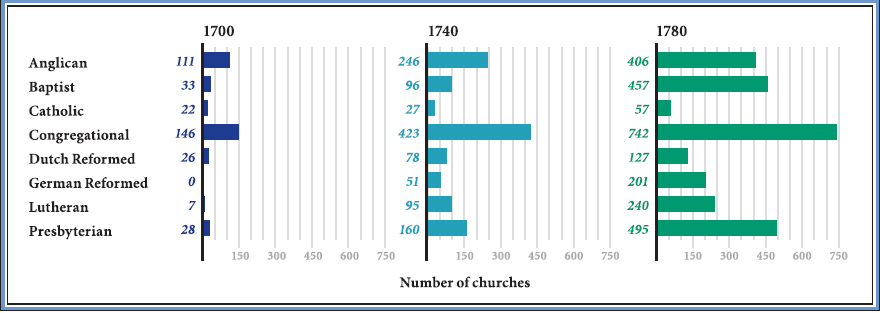America’s History: Printed Page 132
America: A Concise History: Printed Page 115
America’s History: Value Edition: Printed Page 110
Religious Upheaval in the North
Like all cultural explosions, the Great Awakening was controversial. Conservative ministers — passionless Old Lights, according to the evangelists — condemned the “cryings out, faintings and convulsions” in revivalist meetings and the New Lights’ claims of “working Miracles or speaking with Tongues.” Boston minister Charles Chauncy attacked the Pietist New Lights for allowing women to speak in public: it was “a plain breach of that commandment of the lord, where it is said, Let your women keep silence in the churches.” In Connecticut, Old Lights persuaded the legislature to prohibit evangelists from speaking to a congregation without the minister’s permission. But the New Lights refused to be silenced. Dozens of farmers, women, and artisans roamed the countryside, condemning the Old Lights as “unconverted” and willingly accepting imprisonment: “I shall bring glory to God in my bonds,” a dissident preacher wrote from jail.
The Great Awakening undermined legally established churches and their tax-supported ministers. In New England, New Lights left the Congregational Church and founded 125 “separatist” churches that supported their ministers through voluntary contributions (Figure 4.3). Other religious dissidents joined Baptist congregations, which also condemned government support of churches: “God never allowed any civil state upon earth to impose religious taxes,” declared Baptist preacher Isaac Backus. In New York and New Jersey, the Dutch Reformed Church split in two as New Lights refused to accept doctrines imposed by conservative church authorities in Holland.

The Great Awakening also appealed to Christians whose established churches could not serve their needs. By 1740, Pennsylvania’s German Reformed and Lutheran congregations suffered from a severe lack of university-trained pastors. In the colony’s Dutch Reformed, Dutch and Swedish Lutheran, and even its Anglican congregations, half the pulpits were empty. In this circumstance, itinerant preachers who stressed the power of “heart religion” and downplayed the importance of formal ministerial training found a ready audience.
The Great Awakening challenged the authority of all ministers, whose status rested on respect for their education and knowledge of the Bible. In an influential pamphlet, The Dangers of an Unconverted Ministry (1740), Gilbert Tennent asserted that ministers’ authority should come not from theological knowledge but from the conversion experience. Reaffirming Martin Luther’s belief in the priesthood of all Christians, Tennent suggested that anyone who had felt God’s redeeming grace could speak with ministerial authority. Sarah Harrah Osborn, a New Light “exhorter” in Rhode Island, refused “to shut up my mouth … and creep into obscurity” when silenced by her minister.
As religious enthusiasm spread, churches founded new colleges to educate their young men and to train ministers. New Light Presbyterians established the College of New Jersey (Princeton) in 1746, and New York Anglicans founded King’s College (Columbia) in 1754. Baptists set up the College of Rhode Island (Brown) in 1764; two years later, the Dutch Reformed Church subsidized Queen’s College (Rutgers) in New Jersey. However, the main intellectual legacy of the Great Awakening was not education for the privileged few but a new sense of authority among the many. A European visitor to Philadelphia remarked in surprise, “The poorest day-laborer … holds it his right to advance his opinion, in religious as well as political matters, with as much freedom as the gentleman.”
COMPARE AND CONTRAST
Question
In what ways was the spread of ideas during the Enlightenment and the Great Awakening similar, and how did it differ?